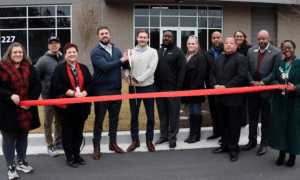Fayette County Commission Chairman Steve Brown wants the county to become a pilot location for autonomous vehicle design and testing.
Brown in a July 24 proposal would have Fayette become Georgia’s first pilot site for testing onboard computer-driven vehicles in live traffic conditions.
The proposal will call for manufacturers and the state and federal governments to combine forces in Fayette County on product design, manned-testing and in-depth study on the creation of a governmental policy to usher in the new technology on the American road network, according to Fayette County Clerk Floyd Jones in a July 21 press release.
“We have had automatic pilot for aircraft for a long time, so I knew we would eventually get to cars and other road vehicles,” said Brown. “Google was the first to take existing technology, meld it into one system and actually test the vehicles on highways, logging hundreds of thousands of miles in California.”
McKinsey’s Global Institute has stated autonomous vehicles will be one of the top 12 “disruptive technologies,” transforming our lives, Jones said.
Jones said Brown has studied transportation issues for decades, but the one issue that has had him absolutely captivated is the development of autonomous vehicles.
Brown believes that using Fayette County as a pilot site would enable a real-life research laboratory to not only enhance the technology, but to also simultaneously develop the proper statutory framework to properly introduce the new transportation paradigm in the marketplace.
“Fayette County makes an excellent pilot site because of low traffic congestion, good road maintenance, variable driving conditions, a well-educated workforce, proximity to Hartsfield-Jackson International Airport for federal transportation officials and technology manufacturers as well as proximity to research institutions like Georgia Tech,” said Brown.
Jones noted that Brown has warned regional and state government interests that ignoring the new vehicle technology will have dire consequences for metropolitan Atlanta, much like the struggles the region encountered by falling behind in Internet development, missing a large portion of the early spoils from the past web-based technological revolution.
“The regulatory debacle we have experienced with unmanned drones is the perfect example of what we must avoid with autonomous road vehicles, and letting product development get well beyond the regulatory process is a really bad idea,” said Brown.
Brown maintains that autonomous road vehicles will be a multi-billion dollar industry.
“Autonomous cars and trucks are projected to create greater fuel efficiency, dramatically increase safety and significantly increase road capacity,” Brown said. “The potential of autonomous vehicles to resolve many of metropolitan Atlanta’s traffic congestion problems at a significantly lower cost than other less-used alternatives like mass transit is enormous.”












Leave a Comment
You must be logged in to post a comment.